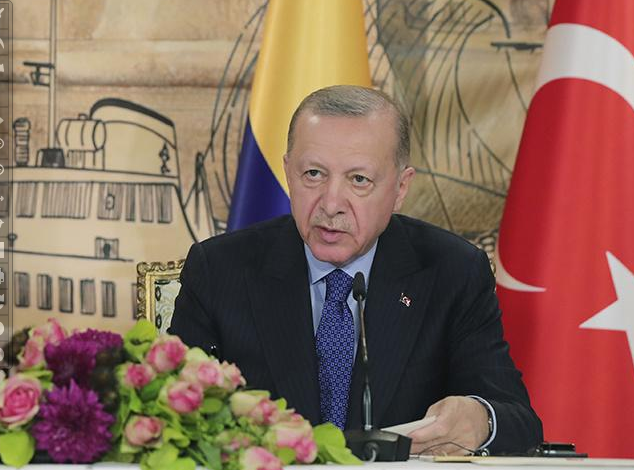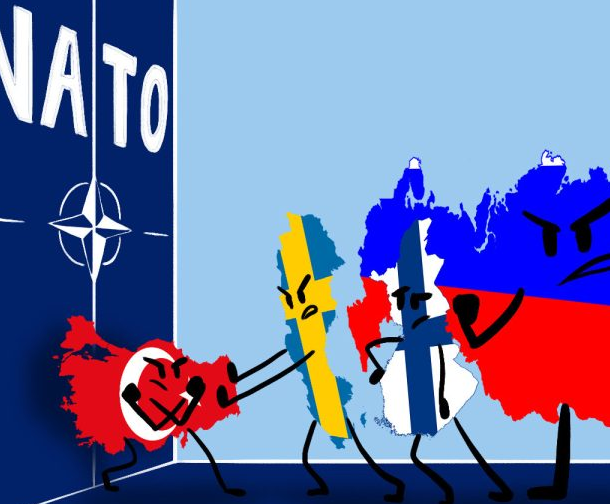Why is Turkey opposed to Sweden and Finland joining NATO, Explained.
In May, historically neutral Sweden and Finland submitted their initial application to join the North Atlantic Treaty Organization (NATO) in response to Russia's invasion of Ukraine.

TURKEY: Two Nordic leaders and NATO will meet with Turkish President Recep Tayyip Erdogan on Tuesday (June 28) to try to resolve the impasse after Erdogan made his objections to Finland and Sweden's fast-track NATO membership public some weeks ago.
Sweden and Finland, two historically neutral nations, first submitted an application to join the North Atlantic Treaty Organization (NATO) in May in response to Russia's invasion of Ukraine. The two Nordic nations were accused by Turkey of backing Kurdish militant groups, which it considers to be terrorist organizations, and Turkey had resisted their admittance.
Erdogan's meeting with the heads of Sweden, Finland, and NATO, according to the presidential spokeswoman, “does not mean we will take a step back from our position.”
Turkey had stated on June 15 that the two candidates had fallen short of its expectations and that Turkish concerns would need to be taken into account in any negotiations.

What is NATO?
The North Atlantic Treaty Organization (NATO), which was created in 1949 in response to the perceived threat posed by the Soviet Union's expansion in post-World War II Europe, was composed of the United States, Canada, and other western European nations.
The North Atlantic Treaty's Article 10 states that any European nation that can “contribute to the security of the North Atlantic area” is eligible to join NATO, which now has 30 members.
However, each member state must consent in order to join. Greece blocked North Macedonia's application to join NATO in 2008 because of a long-standing disagreement over the name “Macedonia” of the nation. Greece only gave its assent in 2018, when the nation changed its name to North Macedonia, and in March 2020 the nation was formally admitted as a member.
NATO's members are committed to mutual defense in the event that any of them is attacked by an outside force, making it basically a collective security alliance.
Article 5 of the North Atlantic Treaty states the main collective defense tenet of the alliance: “The parties agree that an armed attack against one or more of them in Europe or North America shall be considered an attack against them all and consequently they agree that, if such an armed attack occurs, each of them, in exercising the right of individual or collective self-defense recognized by Article 51 of the Charter of the United Nations, will assist the others in defending themselves.”
What complaints does Turkey have?
Finland and Sweden's entrance into NATO has been consistently resisted by Turkey, a member of the organization since 1952 and possessing the second-largest military force inside the organization.
Erdogan asserts that they are “home to various terrorist organizations,” including the People's Protection Units (PPU) and the Kurdistan Workers Party (PKK) (YPG). For decades, the PKK has waged an armed conflict with Turkey, initially in pursuit of an independent Kurdish state, but more recently in pursuit of more Kurdish autonomy and rights within Turkey.
The US, UK, Turkey, and the EU have all recognized the PKK as a terrorist organization. As a terrorist organization, it is likewise prohibited in Finland and Sweden.
In order to repress the PKK and YPG forces in Syria, Ankara seeks written guarantees from the Nordic nations. The YPG is a force with ties to the PKK that operates in northeastern Syria's Rojava region. They contributed significantly to the downfall of ISIS by aiding western forces in their military operations against the group in Syria. According to a Bloomberg story, Turkey has charged the YPG with attacking its soldiers close to the border.
According to a Brookings Institution analysis, Sweden and Finland's unwillingness to extradite PKK members and followers of Fethullah Gulen, whom Ankara accuses of orchestrating a botched coup attempt in 2006, has infuriated Turkey.
Additionally, Turkey requests that Sweden and Finland lift the bans on the export of armaments to the nation that were put in place following Ankara's military action in Syria in 2019.

Are Turkey's positions motivated by any domestic issues?
Critics contend that Erdogan's obstacles to Finland and Sweden joining NATO also have internal origins. Currently, Turkey is dealing with skyrocketing inflation and an increase in the cost of living. Erdogan's emphasis on nationalist themes may help improve his reputation among the Turkish electorate since elections are scheduled for the following year.
In an interview cited by the New York Times, former NATO official Stephanie Babst stated that “this is mostly a message for his political base at home.”
He has an election coming up. He wants to show leadership because of the dire economic conditions in Turkey. I'm scared to say that he is using Sweden and Finland to convey his strategic ideas because he wants to show that he is a tough leader, she continued.
Can Sweden and Finland become members of NATO?
On June 20, the Turkish, Swedish, and Finnish sides resumed negotiations after a lengthy pause. Ibrahim Kalin, the presidential spokesman for Turkey, later told reporters that in order for his nation to comply with the requests of other nations, “binding pledges” were required.
“We don't view any deadlines as limiting us. According to Reuters, he stated, “The manner and speed at which these nations satisfy our expectations will determine the pace and extent of this exercise.
It seems unlikely that the issue will be settled very soon given that Turkey has indicated that it does not intend to welcome Sweden and Finland by the time of the NATO summit (June 28–30).
According to Rose Gottemoeller, former deputy secretary-general of NATO, quoted by The Hill, even if Turkey decided to remove its veto, it will still take the two Nordic nations at least a year to join the alliance.
Finland and Sweden will both be promised military help from other members of the security alliance in the event that they do join NATO.
According to the US-based research tank Council on Foreign Relations, once Finland joins, NATO's borders with Russia will more than treble, adding about 1,300 kilometers of new frontier (CRF). Additionally, NATO would have a stronger presence in the Baltic and Arctic seas.




